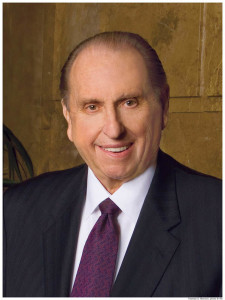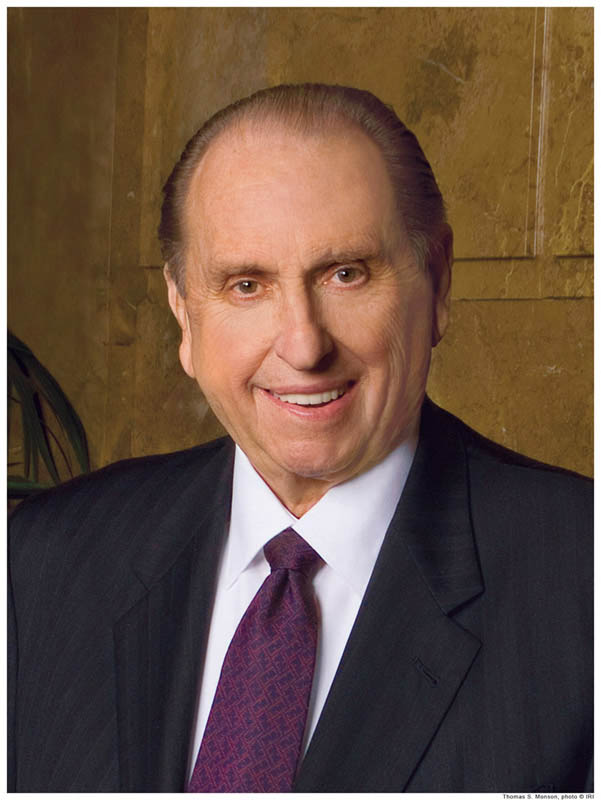Twice a year, Mormons attend or view the General Conference. This conference allows them to hear from their leaders and receive God’s most recent counsel. Speakers are not assigned topics. Instead, they are asked to pray to know what God wants them to say. This means that listening to the choice of topics can tell you what is on God’s mind.
However, the Mormon conference includes more than just speakers. One feature is an opportunity for Mormons to raise their hands and sustain their leaders. If you happened to watch the Mormon conference this year, you may have seen them sustaining their leaders and wondered what it means to them to do this.
When Mormons raise their hands to sustain someone, whether in General Conference or in their own congregations, they are making a sacred covenant. A covenant is a two-way promise between God and man, with God setting the terms. If we keep our part, God will always keep His—but we must keep our part first.
When we sustain our leaders, we are covenanting to support them in their callings (church work) in every way. Although in Conference, the leaders often say the voting has been unanimous, it is not really an election. Each person in the calling has been called by God and we are not supposed to put God to a vote. What we are doing is making a public, sacred, and binding commitment to honor the choice God made.
Mormons preparing to sustain the prophet and apostles do not do a review of what their leaders have done over the past six months and then decide whether or not to sustain them for the next six months. This is not a performance review, but a sacred event. We are giving God a sacred promise to honor and support the prophets over the next six months.
What would a Mormon do if he was concerned the prophet had done something inappropriate? He would take it to God with a humble heart and a sincere desire to know the real truth and ask for a confirmation of his testimony. Once having done so and having sustained the prophet, he is under a sacred obligation to continue to sustain the prophet and his apostles.
“It is a serious wrong in the presence of the Almighty for one to vote to sustain the authorities of the Church and then to go away and oppose them and trample under foot the counsels that they give; and we will be judged of the Lord for it.
It is an important duty resting upon the Saints who vote to sustain the authorities of the Church, to do so not only by the lifting of the hand, the mere form, but in deed and in truth. There never should be a day pass but all the people composing the Church should lift up their voices in prayer to the Lord to sustain His servants who are placed to preside over them. … These men should have the faith of the people to sustain them in the discharge of their duties, in order that they may be strong in the Lord. …” (“Chapter 24: Sustaining Those Who Are Called to Preside,” Teachings of Presidents of the Church: JosephF. Smith, (1998).
Mormons sustain a person in a calling by raising their right hands. This is done whether they are sustaining the Mormon prophet or the door greeter in their own congregations. That raising of hands is only the first step in the process. From that moment on, they are giving their word to God that they will support the person they sustain.
When a Mormon sustains the prophet, it means he will support the prophet’s official actions, whether or not those actions happen to agree with his personal beliefs prior to that time. It means he recognizes the prophet’s prophetic authority and knows that God will not allow someone to continue as the prophet if he falls away. It means acting on the things the prophet counsels us to do, knowing these teachings come from God.
N. Eldon Tanner, a previous General Authority, taught in a General Conference:
“The Prophet spoke out clearly on Friday morning, telling us what our responsibilities are …
“A man said to me after that, ‘You know, there are people in our state who believe in following the Prophet in everything they think is right, but when it is something they think isn’t right, and it doesn’t appeal to them, then that’s different.’ He said, ‘Then they become their own prophet. They decide what the Lord wants and what the Lord doesn’t want.’
“I thought how true, and how serious when we begin to choose which of the covenants, which of the commandments we will keep and follow, we are taking the law of the Lord into our own hands and become our own prophets, and believe me, we will be led astray, because we are false prophets to ourselves when we do not follow the Prophet of God. No, we should never discriminate between these commandments, as to those we should and should not keep.” (CR, October 1966, p. 98.)
Sustaining our church leaders means never attacking them and it means defending them when others do. It means praying for them, encouraging them (especially if the person we sustained is a local person), and trying to find ways to help. For instance, at the local level, a person who sustains the toddler nursery teachers might offer to help out on busy days, might go in to wash the toys, and might compliment the leaders on well-run the program is. At the level of a prophet or apostle, it might mean studying their teachings and praying to know how we can bring our beliefs in line with those teachings—the teachings of God. It means, if our testimony has a shaky spot, praying to ask God what is true and then acting accordingly.
… It is the command of the Lord that we shall meet together to … sustain the authorities of the Church, thus renewing our covenant to uphold God’s authority which He has instituted in the earth for the government of His Church. And I cannot emphasize too strongly the importance of Latter-day Saints honoring and sustaining in truth and in deed the authority of the Holy Priesthood which is called to preside. The moment a spirit enters into the heart of a member to refrain from sustaining the constituted authorities of the Church, that moment he becomes possessed of a spirit which inclines to rebellion or dissension; and if he permit that spirit to take a firm root in his mind, it will eventually lead him into darkness and apostasy. ) (“Chapter 24: Sustaining Those Who Are Called to Preside,” Teachings of Presidents of the Church: JosephF. Smith, (1998).
The late Terrie Lynn Bittner—beloved wife, mother, grandmother, and friend—was the author of two homeschooling books and numerous articles, including several that appeared in Latter-day Saint magazines. She became a member of the Church at the age of 17 and began sharing her faith online in 1992.








Trackbacks/Pingbacks